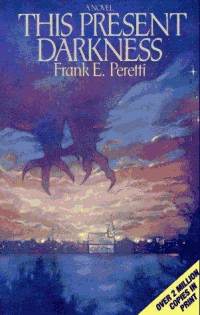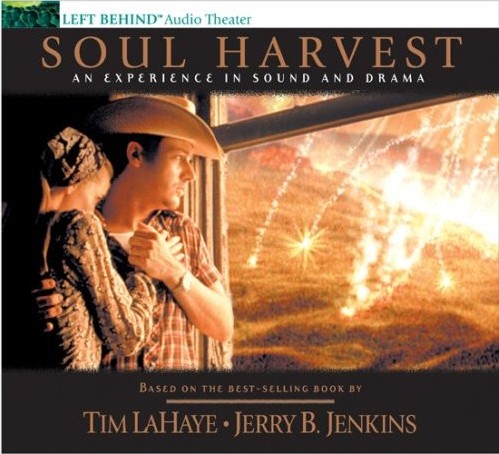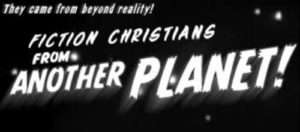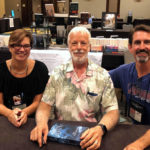Fiction Christians From Another Planet! VII: Attack Of The Spiritoids
“This world is not my home”; “When he dies he’ll go home”; “That body isn’t him, it’s just the shell”; “You don’t have a soul, you are a soul, you have a body” — if you’ve heard any of these lines, or read them in a Christian novel, you’ve just been attacked by a spiritoid.
I define “spiritoid” as that amorphous existence most Christians suspect will be our eternal final form in Heaven, as opposed to living on New Earth (Rev. 21) in resurrected bodies like Christ’s (Phil. 3:20-21). Like most spiritoids, this notion is hard to catch. Yet it’s one of the worst alien beliefs found among multiple species of Fiction Christians From Another Planet(!). In one novel I read, it took the form of a paraphrase of this “quote”:
You don’t have a soul. You are a soul. You have a body.

Of course C. S. Lewis said that.
Yes, C.S. Lewis absolutely said that, if you’re referencing The Book C.S. Lewis Didn’t Write, or the C.S. Lewis from the Mirror Universe who sports a goatee as scholar-in-residence at the First University of the Terran Empire. But! seriously, Lewis never wrote that line, and it’s perplexing why so many assume he did, because it doesn’t even make a lot of sense.
What do so many people find comforting about that phrase? Why else would they repeat it?
Maybe for the same reason many other FCFAP(!) tropes spread: they sound so spiritual.
Unlike other alien notions in Christian fiction and broad Christian-speculative genres, the spiritoid beliefs seem prevalent in particular genres. Here I will break my own series rules and, instead of vague allusions or parody fiction, refer to specific novels by name for these reasons: a) I enjoy these novels and heartily recommend them; b) these authors often include resurrection-body truths alongside spiritoid notions, proving that these beliefs are usually “caught” and not taught because they’ve long been default among us.
1. Spiritual-warfare fiction.
Frank Peretti is boss. This can’t be denied. Still, his pioneer spiritual-warfare-thriller novels from the 1980s also pioneered other notions, since established in spiritual-warfare genres:
- We must open our eyes to the Unseen Reality all around us.
- It turns out the Real Battle is not really what we see, but in the spiritual dimensions.
 Absolutely there’s truth in that — after all, from where did Peretti get his most famous novel title but Ephesians 6:12? Yet in one sense the truth that “the real battle is unseen” can easily become a much more questionable notion, that “only unseen realities matter.”
Absolutely there’s truth in that — after all, from where did Peretti get his most famous novel title but Ephesians 6:12? Yet in one sense the truth that “the real battle is unseen” can easily become a much more questionable notion, that “only unseen realities matter.”
Ah, but what are all those muscular fiery angelic warriors and goblin-like sulfur-spewing demons fighting over? The physical world. Who controls it. Who “possesses” it. (The Devil has previously claimed he owns the planet, as in Matt. 4:9, but “the Earth is the Lord’s, and the fullness thereof,” as in Psalm 24:1, also quoted amidst applications in 1 Cor. 10:26.)
Earth and our bodies, not only “spiritual” realms, are the battleground. Spiritual-warfare fiction should explore this tension. Otherwise we miss exploring how people’s physical conditions interface with their spiritual states. For example, is that person easily diagnosed as “demon possessed” or mentally ill? I suggest fiction can’t give the answers, but it can explore them — explore beyond “that’s easy, this character is under demonic influence.”
2. End-times fiction.

This one featured such trendy news events as a meteor striking Earth, and a disabled cruise ship, both in one episode.
This is fresher in my mind, thanks to my recent resumption of unapologetic Left Behind series fandom. Actually I’ve been re-listening to the fantastic dramatized audio series, and while I remain a fan — who recognizes how God worked in my life through this overall well-written pop thriller series — I also see some of the Gnostic, spiritoid impulses therein:
- Biblically, the Resurrection comes simultaneous with Christ’s return (1 Cor. 15, 1 Thess. 4:3-18). Splitting the two apart, separated by a seven-year Tribulation and perhaps even a 1,000-year kingdom on Earth before the New Earth, now seems odd.
- Left Behind could imply, likely counter to its own creators’ views, that the present-day Church and its work on Earth won’t really matter all that much. Rather, the real action begins when Jesus evacuates the Church in time for a seven-year Tribulation, during which it’s the Jews, not the Church, that do all the significant work, aided by Gentile “Tribulation saints” who are like Church II: The Much Improved Sequel.
- In the final prequel/“simulquel,” The Rapture, the narrative actually follows several characters on the way up at the titular apocryphal event. In Heaven, which is always hard to describe in fiction, characters are able to see the literal mansions where they will live forever. I’m not sure what to make of this, for it seems to reinforce the idea that Christians’ final eternal home is anywhere-else-but-a-resurrected-planet-Earth. Maybe the authors meant this as an advance vision? I do recall New Earth making a cameo appearance at the end of the otherwise plodding and plotless Kingdom Come.
God used Left Behind to change my life. I likely would not love speculative stories so much if not for that series. (Soon I’ll also begin a new blog series based on listening to Left Behind.) Yet I now wonder if even “pre-trib” end-times fiction could emphasize the Resurrection instead of evacuation-of-souls-from-an-inevitably-doomed-to-be-nuked-from-orbit-Earth.
Spiritoid solutions
 One can’t go wrong in studying more in Scripture about Christ’s own resurrection and ours, starting with the above-referenced passages, along with Isaiah 60, Romans 8, and Rev. 21.
One can’t go wrong in studying more in Scripture about Christ’s own resurrection and ours, starting with the above-referenced passages, along with Isaiah 60, Romans 8, and Rev. 21.
Stories that emphasize the goodness of the physical world do exist. In fact, that’s the default view of great fantasy novels, which spend much of their time not only referring to spiritual realities, but taking characters on long journeys through wild lands where by day they find plants and animals, and by night campfires gaze up to the sky in wonder. As we’re learning more to anticipate our resurrected life after the afterlife, let’s find such stories, delight in them for God’s glory, recommend them to friends, and perhaps even write more ourselves.
What other ways might we swat away attacking spiritoids in Christian speculative stories?










































Examine the scriptures daily to see whether these things be so?
Pshaw, who would do that?
I am fascinated that Left Behind changed your life. My husband read one of the books and said it was like a comic book, hence okay. Another friend who read the whole series agreed about the comic bookishness of the series and loved it. I opened one book at random, read a few sentences, and gagged. The writing was wretched and the theology appalling. I was unwilling to slog through anymore of the book to see if what I thought about the series could be corrected. I am looking forward to reading what you have to say about the series. Maybe I’m just a snob?
And the funny thing is I like comic books. I don’t like novels that are like comic books.
Hmm, I wouldn’t say that Left Behind “changed my life” in the way that Scripture itself, or even a more-solid nonfiction book about a particular Biblical truth I’d missed, changed my life. Perhaps I might even say that Left Behind introduced me to the concept of “fandom” and pop culture. It was thrilling to keep track with the books’ and audio dramas’ release dates, follow the story, guess what would happen and who would die, and connect with other fans. I used the internet message-board, wrote fanfiction based on “what if Disney made the film versions?”, and much more.
And yes, I don’t mean to excuse the often-cartoonish writing, espeically in the later books and especially about the increasingly stereotypically-Satanic evil Antichrist.
So come to think of it, Left Behind changed my life “culturally” more than “spiritually.”
That’s a great point. In fantasy, I think the physical and the natural is shown to be parallel to the spiritual and the supernatural. The physical world itself reflects the spiritual state, weeping in anguish because of the Darkness, rejoicing with the Light. I think this is related to the intriguing discussion about magic from Christopher Miller’s column on Tuesday.
Whether or not the quote, “You don’t have a soul. You are a soul. You have a body,” is C.S. Lewis’, and there still seems to be quite a bit of debate over that (see: http://www.mereorthodoxy.com/you-dont-have-a-soul-cs-lewis-never-said-it/ where the comments are as vital as the article), there are those who would argue, myself included, that the idea expressed with the quote is as far from gnosticism or “spiritoid” as one could get. Instead, I’d suggest, as one commentor on the Mere Orthodoxy article did a bit more obscurely, that the idea the words are conveying is simply, “the body is the incarnation of the soul,” and that such an idea is not only the exact opposite of a gnostic consideration of the spirit as more important or real, it also isn’t dualistic at all. Dualism, in varying forms, pits the body against the soul, something rather difficult to do if it is believed that one is the material manifestation of the other. Nor does the idea of the soul as the form of the body (St. Thomas Aquinas) discount or even downplay the physical world and the body. Quite the opposite: it suggests they are intrinsically united. There are also many Scriptural passages – Gn. 2:7, where the translated “being” is literally “soul,” Jer. 1:5, the story of the road to Emmaus and of the Transfiguration, etc. – where this concept can be considered supported. And then there is the Incarnation itself: if God is spirit and became flesh in Jesus of Nazareth, isn’t the very flesh of Jesus the incarnation of the soul of God?
The difficulty, as always, is in recognizing there can be a difference between the meaning in what someone says and how we understand it. Whether or not the “you are a soul” quote is Lewis’, and whether or not it truly is a reference to the theological concept of the body as the incarnation of the soul, it’s not fair to assume it has any foundation in gnostic or dualistic ideas and conveys a “spiritoid” mentality, but that it might only be considered an attempt to prevent too much leaning in the opposite direction – that is, the idea that being human is completely dependent on having a physical body, something equally problematic for any idea of resurrection, Christ’s or our own, as well as problematic for other Christian theological ideas.
That Mere Orthodoxy page has been helpful to me before in understanding why/that this quote hasn’t, so far as we know, appeared in any Lewis literature.
I’m with Matthew Anderson when he comments:
As for whether the quote contains truth, I think it’s enough to say that when people quote it, they are absolutely of the mind reflected by the other tropes I mentioned above: “the body is just the shell,” “heaven [as it is now] is my final home” and things like that. In fact, the Walter M. Miller quote is quite Gnostic in its context, assuming that the body is some temporary appendix that must be put aside; the same is true of another commentator’s paraphrase of what he said was a legitimate Lewis quote, that one should tell a child that “[he] is a soul and has a body- which one day will be shed like cut hair or fingernails.”
It may be that a person’s central identity could be said to be in his/her “soul” and the body, being equally vital, is an outward manifestation. That gets into categories that Scripture hasn’t given us, though. What it does say is things like this: God is Spirit, Christ is body God and man, and man was meant to stay united spirit and body. To be absent from the body is to be with God, but we’re meant to be re-clothed in resurrected bodies (2 Cor. 5) and living in the “tent” that a physical body affords.
The dual nature of man, being spirit (or soul) and body, may also be reflected in how God has chosen to save the world: first by saving His people, then all creation:
This is, however, also speculation, thinking in categories of symbol and parallel that may be hinted at in Scripture, but not to my memory directly spelled out.
Then there’s Paul’s weird passage about not desiring to be unclothed, but to be clothed in our new body, whatever it may be. Because physical death unclothes the spirit. Or something. I’ve never understood that passage.
Either way, we were never meant to have our soul and body separated. Just watching someone die, you can see what a horrible, unnatural thing death is. I’m so glad Jesus will abolish it someday.
Amen, sister.
From my limited vantage point, that actually sounds exactly like the passage’s meaning!
You know, there once was a theologian who loved music. He began composing lyrics that communicated faith, and became a well-known figure in different denominations. In due course, a young woman wrote to thank him for the impact he was having on her faith and her church. They began a correspondence, which led to a deep meeting of the minds. They confessed their mutual interest in a permanent union, and met for the first time well after they were engaged. The lady took one look at the man, and withdrew her pledge for matrimony, saying she could not believe God would be so cruel as to put a great soul in such a wasted vessel. The hymn writer was Isaac Watts. Neither of them were spec fic readers.
The notion of the body as a vessel for the soul is not a new one. (II Cor 4:7, for example, would indicate that the concept was around in Paul’s time.) It would not be unreasonable to argue that this concept is welcome in both Christian and pagan camps, making it a much more approachable subject for writers on either side of the fence to lure unsuspecting foes–er, converts. In real life, I’ve known a fair number of people who reject God specifically because a soul-to-physical-container match is incomprehensible to them (a sister with cerebral palsy, a wife with aggressive cancer, etc.). Blowing off this argument would also seem to spit in the eye of those who find peace in the concept of a new or “whole” body once they enter heaven.
Maybe you’re doing that with this post, maybe you’re not.
But to suggest that a novelist intent on communicating Christ would be better served with deeper descriptive passages than a comprehensive theology? I sure hope that’s not what you meant.
Does the inclusion of a “spiritoid” prove that a writer fully grasps his faith? Of course not. It shows that the writer recognizes the innate and difficult to shake belief in the immortality of the soul. It can be used as a shortcut, to keep from having to resolve or expose some tricksy theological issues. If the soul lives on after a physical death, logically the soul must go somewhere, be housed in some other vessel. Exploring these avenues is a valid function of fiction, as you mentioned.
I’ve come across a lot of writers, especially in the spec fic subcategory, who write vivid and beautiful narratives. They’ve imagined a whole world, and made it as realistic and gripping on the page as possible. Which is quite good. Why aren’t they published? Partly because they have ragged, gaping tears in their theology. And rather than address these gaps (either by assessing what it is they do believe or by facing down the spiritual strongholds represented by these holes), these authors attack “the market” or putter over improving their craft. Neither response heals those tears, which seem to dig deeper into the writers’ wounds.
Don’t get me wrong. Writing craft is important. Be a good writer, by all means. But a significant factor in becoming a good writer is knowing what you mean to say and communicating that clearly. Not to skip over the hard parts of theology, or to get mystical when the going gets rough. So many would-be writers focus on fiction, because that’s what we want to write. But to graduate from wannabes, we should be able to articulate our point. Non-fiction, or essays, won’t get you published, generally, but writing them will force you to consider your point from an outsiders point-of-view and hone that point into a finely crafted instrument. Instead of a clumsy swing at empty air. Writing the story of your heart, I firmly believe, is not merely a matter of saying what you want to say. It’s also stating a truth that someone needs to hear.
Say it well enough to be heard.
Agreed; it’s definitely not new. Scripture itself supports the concept. What I oppose here is the modifier just — as in “the body is just a vessel for the soul.” But our bodies today are wracked with fleshly desires and the consequences of sin and death. They groan just as creation itself groans (Rom. 8), awaiting redemption.
Which is exactly as you mention below:
I certainly wouldn’t tell people at such a point that their bodies are wonderful pure and beautiful things (if I have read you rightly). Rather, Scripture acknowledges physical death in the body, over which we grieve — but not as those who have no hope. We know not only that the soul lives on, but that the body will be resurrected.
Blowing off which argument? Again, it sounds like you’re suggesting a view that “the body is important” applies to present-day bodies. I’m not sure any Christian adheres to such a view, though. All acknowledge these bodies are failing. Yet some opt for a “nuke the planet and physical world from orbit” view, which isn’t Biblical.
Yes, not my intent (I don’t think).
Hmm, interesting contrast. I’d prefer both. Yet I want to acknowledge that there are unknown areas particularly in the “spiritual warfare” field. In suggesting that we can explore more spiritual-warfare issues besides “demon possession,” I added that there are some things we simply don’t know. What is the difference between spiritual oppression and mental illness, for example? That is one thing about which Scripture does not give us all the details — but about which most spiritual-warfare fiction seems much more certain. (It’s a demon, duh. Cast it out or break the curse.)
As a brief aside, the term “demon possession” is confusing, because to most people, including Christians, it implies that a demon can “take control” of a person’s body and mental faculties without the person’s permission or will. That happens with alarming frequency in Star Trek (such as with the P’ah Wraiths in Deep Space Nine), but no demonic influence ever happens in reality without people wanting it. I’m convinced that according to Scripture, demons can only work with the sin people have already generated in their hearts. Human sin is the worst problem.
As noted in my reply to D.M. Dutcher, I’m not here defining “spiritoid” as the same as the human soul (or spirit). Rather in the second paragraph I said that my term “spiritoid” means “that amorphous existence most Christians suspect will be our eternal final form in Heaven, as opposed to living on New Earth (Rev. 21) in resurrected bodies like Christ’s (Phil. 3:20-21).” Emphasis on final form.
For temporary we will certainly be souls, but as one internet “meme” goes (based on a kids’ video game or television show, I think), “this isn’t even my final form.”
Agreed. Yet it’s very difficult to do that. Randy Alcorn in some of his fiction, which dares to try following a departed human soul up to the present-day Heaven, may come the closest to doing it right. However, I’m guessing even he would change some things, for example in his novel Safely Home, because later in his nonfiction work Heaven he goes to great lengths to distinguish the wonderful-yet-temporary “rental housing” of the present-day Heaven from our final dwelling on New Earth.
Myself, I prefer not to speculate much on the present-day eternal state — or else to enjoy only fantasy-world parallels of Heaven (such as the eastern lands of Valinor in Tolkien’s Middle-earth). Contrary to perception, Scripture actually shares more about the New Heavens and New Earth than about the temporary, current, and likely nonphysical Heaven. Yet which world do people tend to speculate about?
Hmm, this possibility intrigues me.
Though Speculative Faith is directed primarily toward visionary-story readers and is not primarily a site of authors-and-craft-and-publication how-to tips, I’d be interested in hearing more of this viewpoint and any evidence for it. At this point I think I agree, but mainly because of two of my presuppositions about storytelling:
Thanks much for your thoughts, Lex. I’ve appreciated all your recent SF comments!
I have no desire to go down in history as the world’s most argumentative human, and I respect your right as the blog poster to have the last word. So, I weighed whether I should add anything to this. Theological and/or “writerese” viewpoints aside, I think there are two points I would like to suggest. And I’m sorry, but I can’t decide which is the chicken and which is the egg, because both come first and both follow from each other.
1. Most spec fic readers–at least all of the ones I know–eventually become writers. We all read enough things that spark our imaginations, or that frustrate our budding sense of aesthetics, that we say to ourselves, “I could write that.” At what point do readers become writers?
2. Exactly whom and towards what are you exhorting with this post? I do not ask this to be harsh or undercutting, not at all. But it seems that more productivity is found in pursuing this understanding of a new term as a writer than as a reader. A reader can like this, or buy that. But a writer can apply that knowledge to generate something a reader would want to pick up and pass on.
As for the theology of a wannabe spec fic writer, we all face the problem of communicating a truth as we understand it. When we write, the elements of our thought process aren’t smoothed out. They’re exaggerated. What we could skip over because we’re used to jumping over that old hole in the floorboards becomes a jagged and dangerous tear in the space/time continuum of our story’s universe. I don’t wish to reference someone else’s work without permission (or cause hurt), so I’ll use an example from my own work.
I have a WIP that hinges on a question of “What if a human, made in the image of God, got ahold of alien intelligence?” I love the gamut of issues this forces me to work through. How God made people, inside and out. The line between the physical and the supernatural (because if I pray for you, that’s not the same as patting you on the shoulder, and vice versa). How God might make various alien races similar or different to Him. Where angels/demons/etc. fit into this universe. How aliens/humans/supernatural entities might interact, and where. So many things I take for granted, that I have to reassess and come to some seriously measured conclusions. I have a few scifi lovers in my local writers group who are furious with me for not writing more of this story (they’ve read the first chapter). They like the concept, but they are intrigued with the characters and plot. Who cares about theology when there are alien cops and cute teenage boys and obnoxious sisters? Well, I do.
The gaps are big. Some of them expose issues I might have, like unforgiveness or selfishness, and I do think part of why God gives us these stories is so that He can work through these issues with us. Some writers never address these issues, or find a way around it. (CS Lewis did. Apparently late in life, he came to the conclusion that he preferred the Anglican church because he could ignore the service and pray more. The idea of ignoring a pastor, or the events that occur in God’s house, does not sit well with me. And yet, looking through Lewis’s fiction, there’s some evidence of this. Nobody goes to church. Encounters with Aslan are magnificent displays for unbelievers or private moments for his followers. No love for pastors, no structure of accountability in the theology of his stories. I never noticed it until I read a biography of Lewis, but then the theological ramifications start staring me in the face…) I am of the opinion that God is big enough to handle a misrepresentation on our part–or to prevent publication until we remember He’s in charge–but it seems a bit lax to me to think we’re excused from examining the faith we write from every angle.
Lex, blogs are little fun unless there’s some disagreement (optimally Christlike). My thanks for your interaction and challenges. For this question:
I actually wrote a response toward the end of this series’s final(?) episode. In short: I approach this topic as a “populist.” Though this does sometimes go back the other way, authors/publishers only provide what people have said they want. So: challenge and change more people’s wants, and change the market.
Some further replies and thoughts, point by point:
So do I. In fact, by not seeming to care about this in the story, you’d be making a theological statement: theology doesn’t matter. And ultimately by saying that “God’s revealed truth about Himself applied to reality doesn’t matter,” you’d be saying “God doesn’t matter.” It’s implicit atheism, worse than the overt stuff.
Your plot possibility also intrigues me, by the way, yet the very premise seems to scream a need for challenging and story-limit-pushing theological exploration.
Interestingly, I touched on Lewis’s views of church in this series’s part VIII.
I agree. My challenge is first for readers to try, because although we know that God will use anything for His glory, we are also not fatalists and are responsible for our choices. This will therefore challenge more authors, from the grassroots.
Lex, that remark stood out to me so much I turned it into a news item at the new Speculative Faith News section. Thanks for an intriguing thought.
I don’t think it’s entirely spiritoid. I do believe in a physical resurrection as you said, but most Christians believe that before that, the soul survives death until then and is present with the Lord. The glorified body at the end will be changed too, with no marriage, so it’s not entirely a one-to-one comparison. You could also speculate on this some more; with eternal physical bodies, eating is for one example is going to change.
The spiritual warfare and end-times stuff is a theological minefield to me. I’m wary of it because those two subjects have some serious potential for abuse. Casting demons of overeating or rebellion out of people, or too specific prophecies of the end creating sects that hold dangerous ideas are two examples of abuse. While I’d probably be okay with using visual ideas from it, making detailed theological statements over them worry me more than say speculating on whether or not an uplifted dog would have a soul and come to worship Christ.
I hit Like above, because I agree with everything. A few qualifications:
By “spiritoid” I refer to the vague belief that Christ’s people will have a vague and likely nonphysical existence for the rest of their lives. That’s far different from the Biblical truth in passages such as 2 Cor. 5 that because of death, souls must be separated from the body temporarily, to await in Heaven and consciously the final resurrection. Like any other truth, soul/body separation and the goodness of the soul and body, etc., are all held as true by the Bible.
Indeed, because human marriage will be fulfilled at the union of Christ and His Church. My wife and I like to say what I recall my parents saying: that they would still remain very good friends (and surely with a special relationship) for eternity.
Agreed, and I don’t fault Peretti (or other fiction authors) for that. People need to know that this is fiction, and unfortunately some “nonfiction” authors and spiritual-warfare advocates, such as Neil Anderson, didn’t seem to understand that.
Recently a FB friend insisted to me that he felt Peretti was Biblical. With some exceptions, I agree. More often the fault lies in what people make of such fiction.
Sounds like you refer to a specific incident or story. I’m curious who did that!
Yes, the sort of “heaven in the clouds idea” is more popular fiction than scriptural, in the same way that angels are men with wings are. It’s just the soul/body divide is more of an understandable error if they extend it to the end. Thankfully, the idea that matter bad/spirit good hasn’t entirely taken over the church, and we’ve been pretty good at resisting what is one of our oldest heresies.
Perreti in a way was biblical. Daniel talks about Michael as head of a specific area, and fighting against other powers, and in Jude, Michael contending against satan. But he made such a compelling story that it became popular lore. An example of another one is the Angels of Mons legend, where Arthur Machen wrote a story about angels rescuing the British in WW1, and it became taken as true events. It really is a danger.
There isn’t a story that deals with that specifically, as far as I know. Cordwainer Smith wrote about uplifted animals, the Underpeople, forming a Holy Insurgency and guiding their masters back slowly to the root of faith, but it’s very arch and very subtle. I was thinking more of David Brin’s Uplift War books, which are secular. I have my own ideas, which I’m working on, but given my erratic schedule these days, I say nothing.
One of the books that come to my mind is the bit in The Great Divorce where Lewis says (paraphrased) that the Bright People’s clothing–crowns and robes and such–was every bit as much a feature as eyebrows and hands…quite a contrast to the idea of a non-physical afterlife.